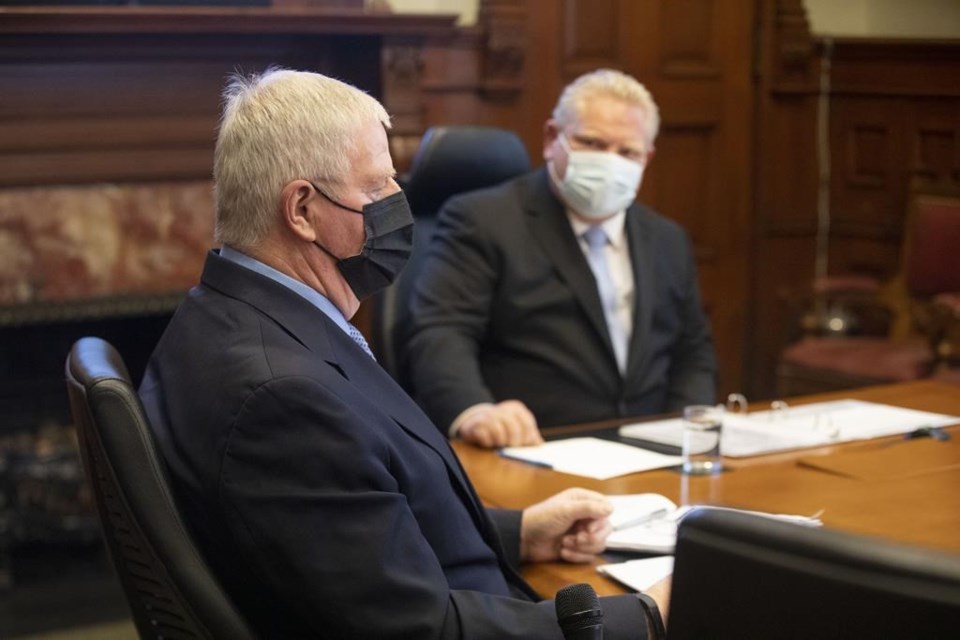TORONTO — Two more of Ontario's COVID-19 hot spots will move into lockdown next week, a day before the province administers the first vaccines against the virus to several thousand health-care workers.
Premier Doug Ford said Friday that the decision to impose the strictest restrictions on Windsor-Essex and York Region underscores the fact that the pandemic isn't over, particularly as new projections show Ontario could see 2,500 daily cases by the end of the month if the current growth rate continues.
"We're still battling the second wave and today our government took necessary actions to slow the spread of COVID-19," he said.
"Yesterday's modeling update, and today's changes to the regional alert levels – they're a reminder that we have to stay vigilant."
The latest lockdowns take effect Monday and will last at least 28 days.
They mean, among other things, that there will be no indoor organized public events or social gatherings except with members of the same household, and include a recommendation to only leave the house for essential reasons.
The lockdowns will also limit non-essential retailers to curbside pickup, ban indoor dining at restaurants and bars, close personal care services, and shutter indoor sports facilities.
Five other regional health units will also see new restrictions imposed next week under the province's colour-coded, tiered pandemic response framework.
Middlesex-London, Simcoe Muskoka, and Wellington-Dufferin-Guelph will move into the red "control" zone.
The Eastern Ontario Health Unit will move to orange "restrict, while Leeds, Grenville and Lanark will move to yellow "protect."
Toronto and Peel Region were moved into the lockdown category last month.
The province reported 1,848 new cases of COVID-19 on Friday, and 45 new deaths due to the virus. It said 469 new cases were in Toronto, 386 in Peel Region, 205 in York Region, and 106 in Windsor-Essex.
The Windsor-Essex public health unit has ordered all schools in the region to close starting Monday, and several church leaders in the area have announced a suspension of in-person services.
In York Region, Markham Mayor Frank Scarpitti said he respected the provincial decision to impose a lockdown, but noted he would be advocating for help directed at small businesses that will be forced to close.
He also urged people to follow public health rules.
"This move by the province of Ontario does not let us off the hook," he said. "Almost 50 per cent of cases in York Region are the result of close contact (family, friends and work colleagues) transmission."
The CEO of the Registered Nurses Association of Ontario said the new lockdowns still won't go far enough to stop rising cases. Doris Grinspun said the province should ban people from travelling from hot spots to other communities.
"That is critical because what you're seeing is a spread from one region to another," she said. "Someone thinks, 'well I need a hair cut, I'll just travel 20 minutes away.' ... That's how we get this spread."
The new restrictions will take effect before the province's first COVID-19 vaccinations will be administered on Tuesday.
Ontario expects to receive 6,000 doses of Pfizer's COVID-19 vaccine on Monday and will give them to approximately 2,500 health care workers at a hospital in Toronto and another in Ottawa.
Retired gen. Rick Hiller, who is leading Ontario's vaccine task force, said half the shots will be administered next week, and the other half will be intentionally held back to give the same workers a required second dose 21 days later.
"Given the sort of information flow of what we know about the supply, which is very little at this time ... we decided it was better to err on the side of caution," he said.
An additional 90,000 doses of the Pfizer vaccine are expected to arrive later this month and are to be provided to 14 hospitals in COVID-19 hot spots.
Hillier has said the province also expects to receive between 30,000 and 85,000 doses of the Moderna vaccine by the new year, pending its approval by Health Canada.
He said the start of the vaccination program next week will serve as a pilot that will help fine-tune the next step of the rollout.
"Once that is finished, both (hospitals) will write a playbook on how they've done the vaccinations, how they've handled the Pfizer vaccine, what they've learned from it, and we will share that around Ontario with the hospitals for the next phase," he said.
Ontario's Solicitor General Sylvia Jones said that the hospitals receiving the first shots have made security arrangements to ensure the vaccine is safe from theft.
"This vaccine is liquid gold," she said. "We are getting a very limited supply, and we wanted to make sure that we had done our due diligence to ensure that the sites were ready (and) protected."
This report by The Canadian Press was first published Dec. 11, 2020.
Shawn Jeffords, The Canadian Press

